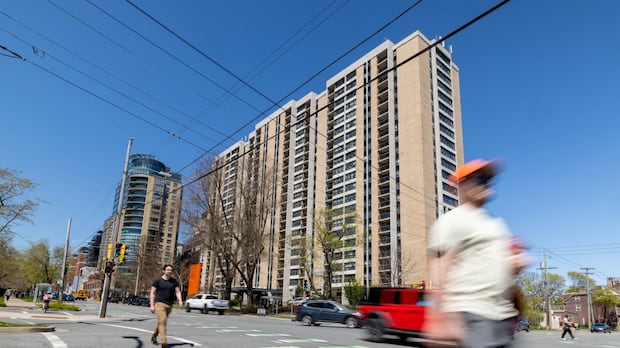Nova ScotiaA new tool created by real estate firm Turner Drake & Partners blends multiple indicators of housing markets across Canada to assign scores to be used for comparison. It shows the financial burden on renters in Nova Scotia is greater than in any other province.Government focused on building more supply, but planning prof says that isn’t answerTaryn Grant · CBC News · Posted: Nov 24, 2025 5:00 AM EST | Last Updated: 2 hours agoListen to this articleEstimated 4 minutesThe audio version of this article is generated by text-to-speech, a technology based on artificial intelligence.Pedestrians and vehicles stream in front of a high-rise apartment building in Halifax in this file photo. (Robert Short/CBC)The affordability burden on renters is worse in Nova Scotia than in any other province, according to new calculations by real estate firm Turner Drake & Partners.This month, the firm released a new tool for measuring and comparing the state of housing markets across the country, which it calls the Residential Market Pressure Index.The index assigns a score out of 100 to every Canadian province and the nation as a whole. The higher the score, the more severe the “pressure” – or, put another way, the harder it is for people to find affordable housing.“Nova Scotia must confront entrenched affordability challenges to restore balance,” the firm said in a report that accompanies the index scores.The burden of renting is one of four factors that make up a jurisdiction’s overall score. The other factors are the affordability burden of ownership, the efficiency of building more supply and the demand pressure from population growth. In short: rent pressure, ownership pressure, supply pressure and demand pressure.While Nova Scotia topped the list for rental burden, it does not have the overall high score. Turner Drake’s initial public release looks at the second quarter of 2025, which ranks Ontario first and Nova Scotia second.The firm subsequently shared index scores for the third quarter with CBC News, which puts British Columbia at the top, with Ontario second and Nova Scotia third in the overall ratings. But Nova Scotia remains at the top in the rental burden category.The index is the brainchild of Jigme Choerab, manager of Turner Drake’s economic intelligence unit. He said he wanted “one number to summarize the market and be able to compare everything.”“The index was something that gave a whole picture of the entire market, just not one particular indicator,” he said.Choerab said the tool is meant to diagnose problems, not prescribe solutions. He said academics and policymakers are better positioned to decide how to respond to the challenges the index highlights.Jigme Choerab, manager of the economic intelligence unit at real estate firm Turner Drake & Partners, pictured in the firm’s Halifax office Nov. 20, 2025. (Dan Jardine/CBC)Nova Scotia Housing Minister John White declined an interview request. Chrissy Matheson, a spokesperson for the Department of Growth and Development, said Turner Drake’s findings are “of no surprise to us.”“This is why the department has been working so hard to increase housing supply in this province,” she said, highlighting increased housing starts and rent supplements, among other housing-related initiatives the Progressive Conservative government has undertaken.Ren Thomas, associate professor at Dalhousie University’s school of planning, said Turner Drake’s findings validate the common understanding that people still struggle to afford rental housing in spite of more housing construction and an uptick in vacancy rates in the past year.Ren Thomas is an associate professor in the school of planning at Dalhousie University. (Jennifer Chevalier/CBC)Thomas said the proposition that more supply is the ultimate solution is being disproved. Whether the units being built are market or non-market (such as non-profit or public housing) matters greatly, she said.“These other provinces that have lower scores — notably Quebec and to some extent Newfoundland and Labrador, Saskatchewan — are places where they have accepted that non-market housing has to play a bigger role and they are now kind of moving in that direction,” Thomas said.Nova Scotia has committed to build some additional public housing and it has encouraged some non-profits to build or buy rental housing. But, Thomas noted, it could take many years before the non-market housing sector grows enough to make a dent in the province’s affordability problem.MORE TOP STORIESABOUT THE AUTHORTaryn Grant covers daily news for CBC Nova Scotia, with a particular interest in housing and homelessness, education, and health care. You can email her with tips and feedback at taryn.grant@cbc.ca
N.B. trails Nova Scotia in latest ranking of rental affordability pressures











